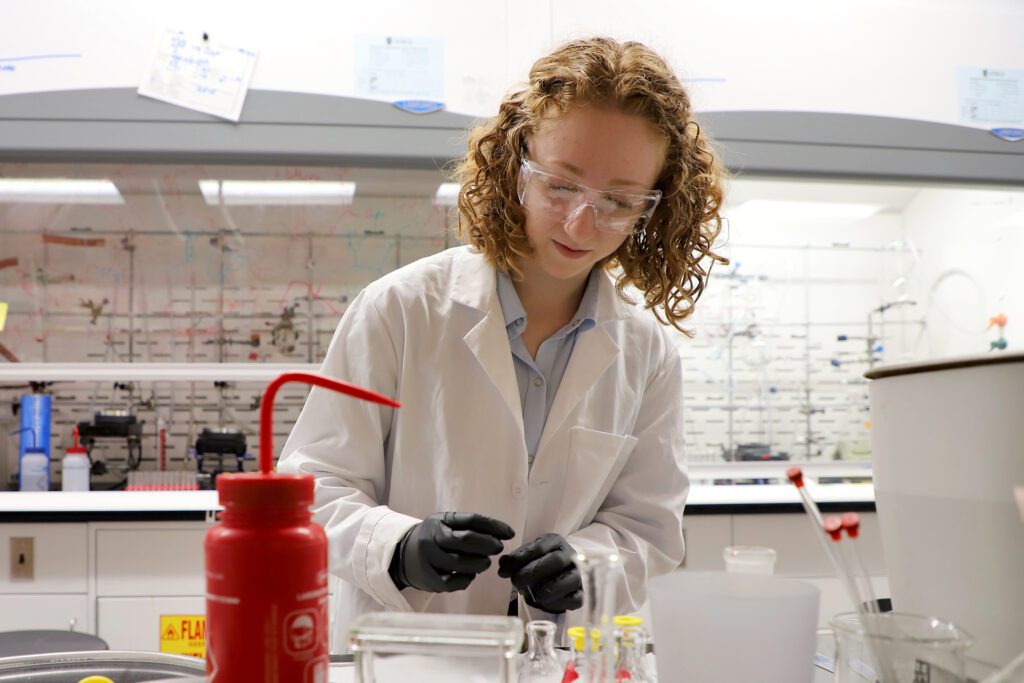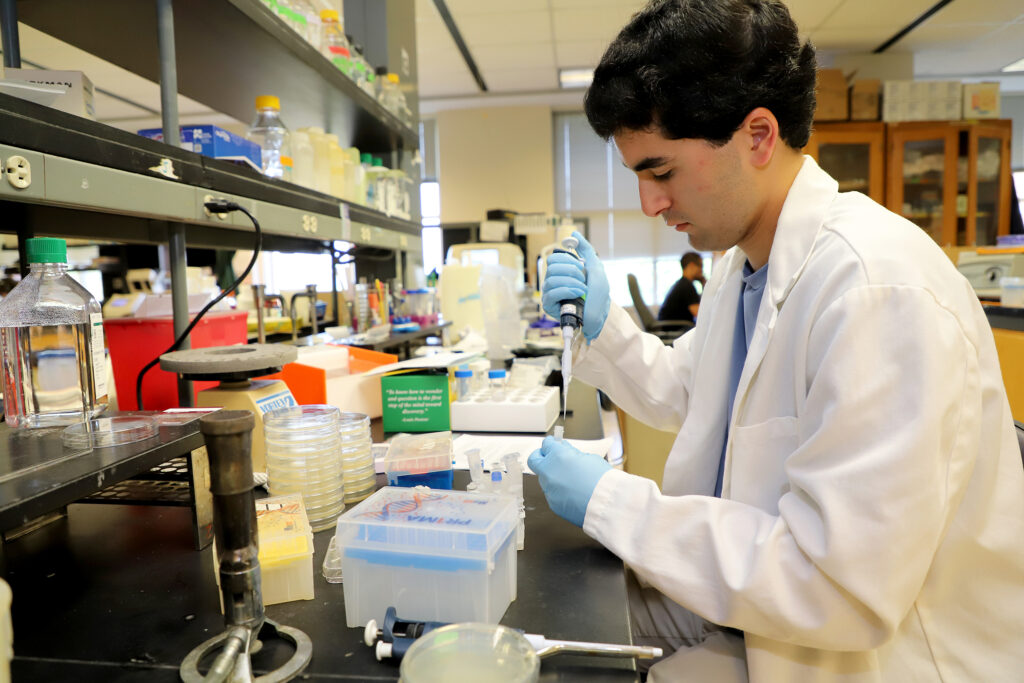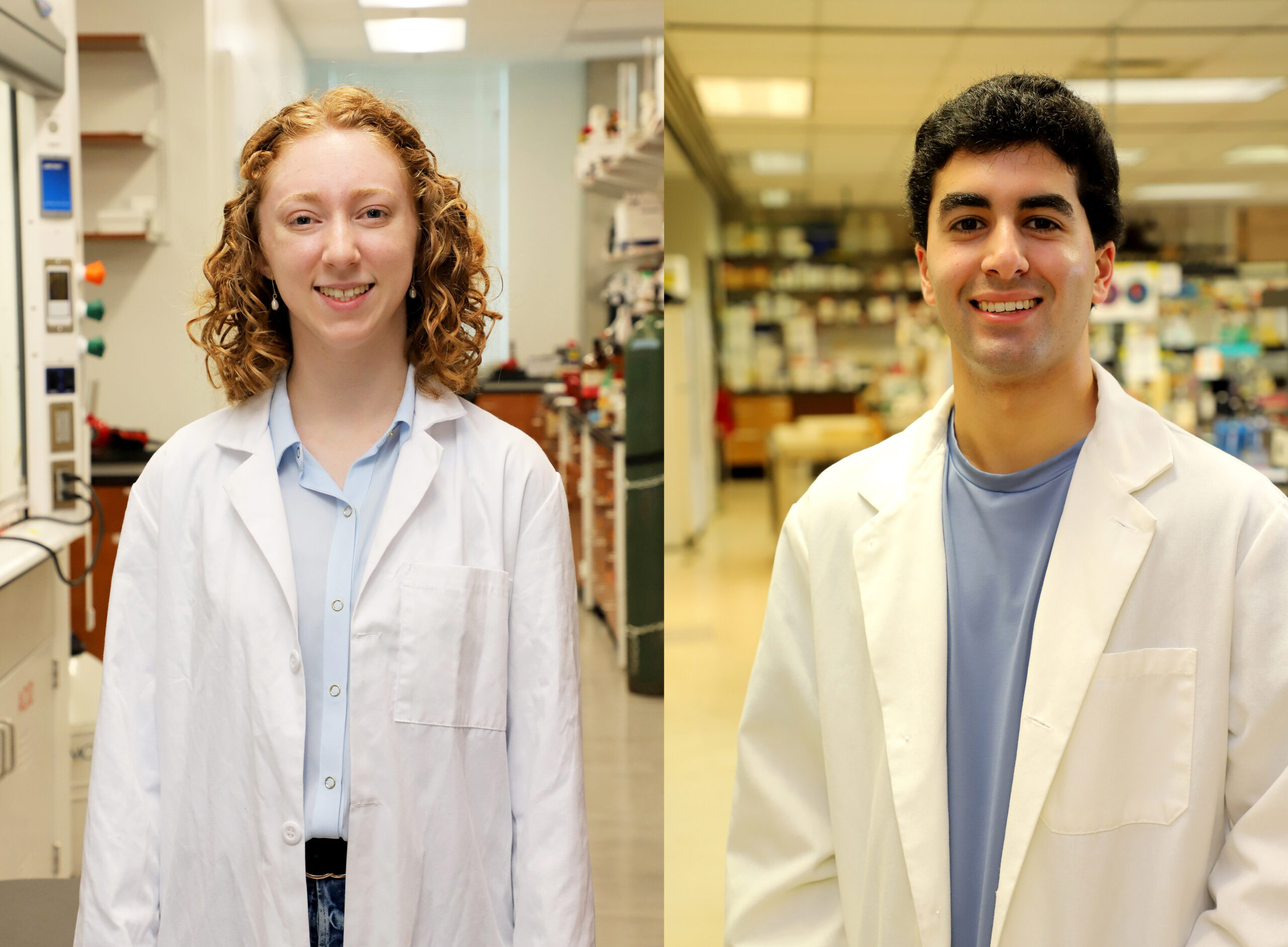University of Georgia juniors Audrey Conner and Emilio Ferrara have been named 2023 Barry Goldwater Scholars, earning the highest undergraduate award of its type for the fields of mathematics, engineering and natural sciences.
Both are Foundation Fellows and Stamps Scholars in the Franklin College of Arts and Sciences and the Morehead Honors College. Conner, from Tifton, is majoring in chemistry; Ferrara, from Atlanta, is majoring in biochemistry and molecular biology. Both presented their research at UGA’s annual undergraduate research symposium—the CURO Symposium—in early April.
Since 1995, 66 UGA students have received the Goldwater Scholarship, which recognizes exceptional sophomores and juniors across the United States.
“The University of Georgia commends Audrey and Emilio on this prestigious honor,” said President Jere W. Morehead. “We are excited to see them excel as undergraduate researchers who are already contributing a great deal to their fields and to UGA’s research enterprise.”
This year’s 413 Goldwater Scholars include 48 mathematics and computer science majors, 57 engineering majors and 308 natural sciences majors. The recipients were selected from a field of more than 5,000 college sophomores and juniors who were nominated by 427 academic institutions nationwide. Each awardee will receive up to $7,500 per year toward the cost of tuition, fees, books and room and board.
“Audrey and Emilio represent the best of undergraduate research at UGA, and we are so proud of their accomplishments,” said Meg Amstutz, dean of the Morehead Honors College. “We are thankful for the UGA faculty and staff dedicated to helping both of them achieve their status as Goldwater Scholars.”

Conner plans to pursue a doctorate in organic chemistry and conduct research in organic synthesis and methodology. She wants to explore the intersection of computational and experimental organic chemistry by using quantum chemistry methods to guide experimentalists during key stages of synthesis and explain phenomena seen in the laboratory.
She explains that, “from the asphalt we drive on to the emotions we feel, chemistry plays a key role in helping us understand our universe. I plan to pursue a Ph.D. in chemistry and a research career as a faculty member at a research-focused institution, exploring how infinitesimally small particles and their infinitesimally small relations govern the world around us, and how these properties are in turn governed by mathematics that can be exploited to predict properties of molecules that do not yet exist.”
Conner’s research experience at UGA started in 2019 as a high school student studying peanut genetics in Tifton through UGA’s Young Scholars Internship Program. Her college research career began as a freshman, conducting computational chemistry research with Steven Wheeler, a professor of chemistry, to develop a predictive model for the strength of pi–pi stacking interactions that will allow medicinal chemists to use stacking in drug design. In the summer of 2022, she also began research with Christopher Newton, an assistant professor of chemistry, working on the experimental development of a novel reaction sequence to access biaryl systems, a common motif found in organic molecules. Currently, Conner works with both Wheeler and Newton, integrating her computational and experimental backgrounds.
This summer, she will be working at Yale University, conducting theory research to computationally screen catalysts using machine learning.
Conner is minoring in math, writing an Honors research thesis and taking graduate-level classes in computational and organic chemistry. She is an exam director and the lab-event coordinator for Science Olympiad Outreach at UGA. She also has served as a MathCounts tutor and a USDA biological sciences aid and has received multiple CURO Research Awards. In 2022, she was recognized for an outstanding presentation in the field of computational/theoretical chemistry at the Gulf Coast Undergraduate Research Symposium at Rice University.

Ferrara plans to pursue a doctorate in biomedical sciences and research the next generation of curative genetic medicines for rare diseases. His goal is to move these discoveries from the lab into FDA-approved drugs, ultimately starting his own biotechnology company.
He believes the effective delivery of genetic medicines is the key to treating many rare diseases.
“I want to address critical unmet needs for patients and develop curative genetic medicines,” Ferrara said. “Genetic medicines deliver nucleic acids to fix, replace or fine tune expression of certain genes. By supplying patients with new functional copies of genes or fixing mutated genes, programmable genetic medicines provide the biological ‘source code’ to treat and cure rare genetic diseases.”
Ferrara’s research journey, like Conner’s, also began in 2019. He studied enzyme kinetics at Georgia State University and led his own mini-project, which resulted in a scientific paper that is being submitted to the Journal of Biological Chemistry.
As a first-year student at UGA, he worked with Fikri Avci, now an associate professor at the Emory Vaccine Center. Ferrara studied new vaccine targets for Streptococcus pneumoniae, received multiple CURO Research Awards, presented twice at the annual CURO Symposium, wrote an Honors research thesis on his work. He will receive a research distinction on his transcript upon graduation. He is now conducting research on CRISPR-Cas systems with Michael Terns, a Regents’ Professor of Biochemistry and Molecular Biology and Genetics.
Ferrara is minoring in pharmaceutical sciences. He participates in the Innovative Genomics Institute’s CRISPR Journal Club and works with KdT Ventures, a biotech venture capital firm. He also is the UGA Interfraternity Council President and serves on the UGA Division of Student Affairs Student Advisory Board.
This summer, he will conduct research at Tavros Therapeutics, using CRISPR technologies to discover gene combinations that can kill cancer, known as “synthetic lethal relationships.”
UGA’s major scholarships office, housed in the Morehead Honors College, provides students across campus with assistance as they apply for national, high-level scholarships. For more information, contact Jessica Hunt, assistant dean and director of scholarships, at jhunt@uga.edu or visit https://honors.uga.edu/scholarships/external-scholarships/.


